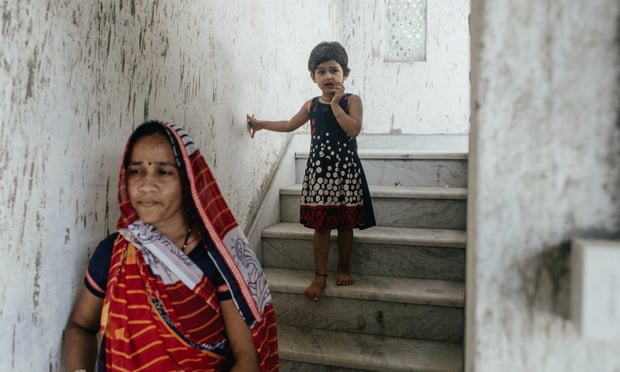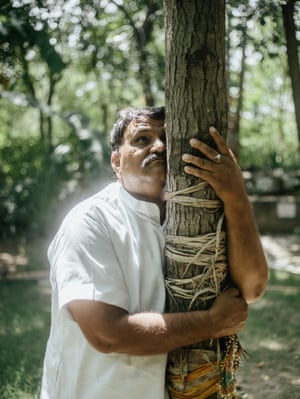- UID
- 20
- Online time
- Hours
- Posts
- Reg time
- 24-8-2017
- Last login
- 1-1-1970
|
Grief-stricken after his daughter’s death, the chief of Piplantri village declared that every newborn girl would have a tree planted in her honour. In the process, he sowed the seeds of cultural, environmental and political revolution.

Girl in Piplantri, Rajasthan. Since 2006, 350,000 trees have been planted in the village. Photograph: Zacharie Rabehi/Le Journal for the Guardian
▼ Shyam Sunder Paliwal knows his way through the trees. Pushing through low branches, he reaches a shady copse where a profusion of different varieties grow. Every evening, he comes here on his motorbike to see one tree in particular, a burflower –kadamin Hindi – that symbolises sublime love. In the silence of the copse, he wraps both arms tightly around the slender trunk and rests his head against it, eyes closed. “This is my daughter’s,” he says.
Kiran, Paliwal’s 16-year-old daughter, died in 2006 – a tragedy he marked by planting the burflower tree. He went on to channel his grief into a mission. “She meant so much to me. How could parents kill a baby girl in the womb?”
He knew what used to happen in Piplantri when a baby girl was born. A family member would push a hard, jagged grain into her mouth. That would generally be enough to start an infection that led to the baby’s death.

Shyam Sunder Paliwal hugs the burflower tree planted in remembrance of his daughter. Photograph: Zacharie Rabehi Agence Le Journa for the Guardian
But after Kiran’s death, Paliwal, the village chief, vowed there would be no more piteous wailing when a girl child was born. Henceforth, the birth of a baby girl would be celebrated with the planting of trees.
As the “sarpanch” or elected village head, his word and passion carried weight. On the appointed day, every monsoon, new mothers spread red fabric inside a large wicker basket. They lay their baby girls inside and carry them to the spot where the new saplings are to be planted. Since 2006, 101 trees have been planted for each of the 65-70 baby girls born in the village every year.
Piplantri, which is built on a hill, lies on the semi-arid land of Rajsamand district in India’s Rajasthan state. Yet lookdown at the undulating landscape below the village and you will see a carpet of green. It wasn’t always so. “In 2005, the drought was so bad the government had to send us water trains,” Paliwal recalls.
The change began with Kiran’s tree. For Paliwal went far beyond the planting of that one special day. He kept planting trees throughout the year and urged the other villagers to do likewise. They laid pipes to take water to the saplings, dotted all around. A total of 350,000 trees have been planted.
“With this, I’m doing two things: showing joy at the arrival of a daughter and honouring the land where my ancestors lived and died,” says Paliwal.
At the entrance to Piplantri, a large hoarding carries the names of all the girls born over the past year. For Kamla Devi, the hoarding symbolises how Piplantri has changed. With four daughters and no son, she would have been an object of pity some years ago. Now Devi is happy with her family.
The village of Piplantri before and after the planting of trees
“My husband is even happier than I am with our daughters,” she grins. “As long as we educate them, there is nothing a boy can do that they can’t do.”
As a gesture of commitment to the trees, on 15 August Devi’s daughters and the other young women in the village celebrated the festival of “rakhi” – when sisters tie red and gold threads around brothers’ wrists as a token of love – by tying the sacred threads around trees.
Alongside the trees, donations are collected whenever a girl is born so that a sum of 31,000 rupees (£316) can be put aside. With interest, the family has an investment that will match a potential dowry. “It gives the family financial security. In return, they pledge to look after the trees, send her to school, and not marry her off before the legal age of 18,” says Paliwal.
It is a mission that drives him. All day, he is on the go, whizzing around the village on his motorbike, checking girls are in school and saplings are tended, and ensuring the rainwater harvesting that he started is working. In quiet moments, he sits in the shade of the tree nursery, cutting up bottle gourd for the hens to peck. (▪ ▪ ▪)
► Please, read the full note here: Source |
|